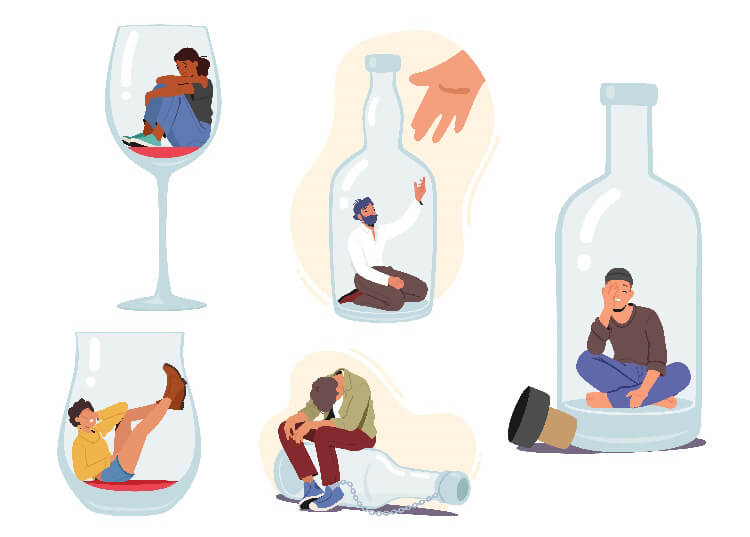AA has been successful in getting millions of people well
Over the last 89 years, there has been no precise record kept of the numbers of thousands of people that Alcoholics Anonymous (AA) has helped to get well and live a life free from addiction. However, what is certain is the fact that the simple methodology of AA and the 12 Step programme is effective and it does work.

Why does AA sometimes not work?
With such a record of success, you would have thought that anyone with an alcohol dependence or addiction would have leapt at this approach to getting well. That is not the case. A major factor is that people will attend AA meetings, generally due to pressure from family and loved ones, and whilst they are still drinking with little real intent to stop. In these cases, they will tend to focus more on how much they are different from the other people there and not how they have behaviour and feelings in common. They can also use the ‘God’ word (which is referred to once in the 12 Step Programme) as a reason for why AA is not for them. When (not surprisingly) nothing changes with the way they feel about their drinking and nor in the actual amount they drink, they make the assumption that AA does not work for them.
An alcohol detox is just the start of getting well
These days, being admitted into a residential addictions treatment centre or alcohol detox clinic is the only immediate way to get a medicated detoxification from alcohol. This will usually be overseen by a doctor and the care team. A detox, though, is just the start of breaking the addictive cycle. It is the safest medical way of immediately stopping the consumption of alcohol.
What is almost more important is to ensure that if you are going into a detox clinic that they also provide a robust and structured daily therapy programme. This should include lectures and written work around the 12 Steps of AA. This will help gain an understanding and knowledge of AA and the workings of AA support groups. Essentially, AA is a fellowship of men and women which people with an alcohol problem will start to attend with others whilst in treatment.
Many people who start their journey to sobriety in rehab will then engage with the 12 Steps and AA meetings. Following a detox, they are often in the correct mental state to understand that AA presents them with a process of recovery which helps them to change their thinking and behaviour. This helps them to live their life free from alcohol without having to struggle with constantly using their willpower. It helps them to live happy and fulfilled alcohol free lives.
For how long do I need to be in alcohol rehab?
The usual time period to be in a residential addictions clinic is 28 days. An alternative option might be for 14 days but the chances of long term sobriety will be less. To just go in for a 7 day alcohol detox will usually result in there being a relapse within weeks of leaving the unit. It is important to gain an understanding of at least the first three Steps as they form the basis of avoiding a relapse. They are also the first Steps of a bridge to normal living.
Steps 1 to 3 of the 12 Step Programme
The first two Steps are thinking Steps with Step 1 focusing on admitting and accepting that we are powerless over alcohol. Step 2 is about recognising who on this planet can help us and Step 3 is the action Step whereby we let them help us. In other words our problem can be solved by letting one sober alcoholic help another sober alcoholic to avoid a relapse. In fact, the only requirement for AA membership is a desire to stop drinking.
What to do after leaving alcohol rehab
Having left treatment from an addictions rehab, it is very important that we maintain weekly attendance at AA meetings, initially at least 3 times a week. It helps not to have to think “I can never drink again,” but to wake in the morning and say to ourselves “I will not drink today.” If in early recovery the urge to drink returns, then we need to share our feelings with either someone at the alcohol rehab clinic that we attended or with a person whose telephone number we have taken at an AA meeting. If we don’t do this then the mental craving will increase. That is when we find out that our will power does not work with addiction and usually a relapse will occur. Humility plays a big role in getting well. We need to accept that there is a life without alcohol – but not one with it. We need the help of others in recovery to get that life. Someone who is told they will die as a result of a peanut allergy does not think it is OK to have the odd peanut. Unbelievably those with an alcohol addiction quite often think “well one will not hurt” – and then within weeks they are drinking more than before they had an alcohol detox. The key is to let others help you on your journey and not to try this alone.
AA works!
The AA programme has proven to be infallible for many hundreds of thousands of people. We only need to work it to the best of our ability in order to remain alcohol free and to have the chance of living a fulfilled life.
